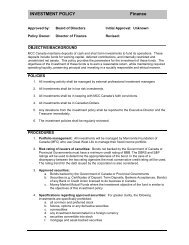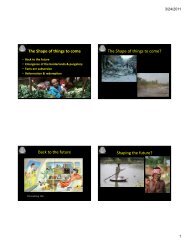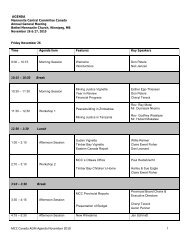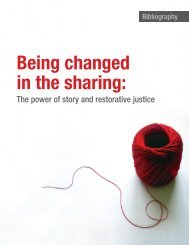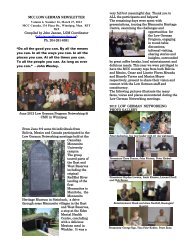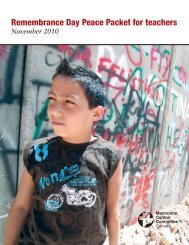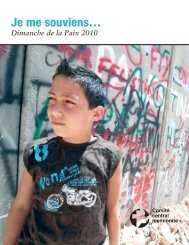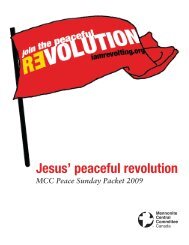Walking together: Healing and hope for Colombian refugees
Walking together: Healing and hope for Colombian refugees
Walking together: Healing and hope for Colombian refugees
You also want an ePaper? Increase the reach of your titles
YUMPU automatically turns print PDFs into web optimized ePapers that Google loves.
w a l k i n g<br />
t o g e t h e r<br />
13<br />
CONTENTS AND METHOD<br />
This resource contains five chapters. The first chapter, History <strong>and</strong> Context of Forced Displacement in<br />
Colombia, is intended to help churches better underst<strong>and</strong> the history <strong>and</strong> context of the armed conflict<br />
in Colombia <strong>and</strong> the factors that continue to cause displacement <strong>and</strong> threat <strong>for</strong> <strong>Colombian</strong>s.<br />
The second chapter, Characteristics of the Refugee Journey, looks at the range of traumatic experiences<br />
that <strong>refugees</strong> often endure be<strong>for</strong>e, during, <strong>and</strong> after flight as well as the changes in identity that accompany<br />
each stage. The chapter concludes with an analysis of the phases of adjustment that <strong>refugees</strong> go through<br />
upon arriving in Canada <strong>and</strong> the role that the church can play in helping the refugee family pass through<br />
those phases <strong>and</strong> build a positive new identity in Canada.<br />
The third chapter, Underst<strong>and</strong>ing our Differences, focuses on building cross-cultural underst<strong>and</strong>ing<br />
between Canadians <strong>and</strong> <strong>Colombian</strong>s. It contains sections on the importance of building cross-cultural<br />
competence, <strong>Colombian</strong> cultural tips, <strong>and</strong> observations from <strong>Colombian</strong> <strong>refugees</strong> in Canada. The chapter<br />
concludes with a section on using interpreters.<br />
The fourth chapter, Promoting Restoration from Refugee Trauma, is intended to help churches<br />
underst<strong>and</strong> the normal effects, reactions <strong>and</strong> concerns <strong>for</strong> survivors of trauma related to war <strong>and</strong> human<br />
rights violations. Effects of trauma on the individual <strong>and</strong> the family, useful trauma recovery strategies <strong>and</strong><br />
tips on talking to survivors of trauma are addressed.<br />
The fifth chapter, Planning <strong>and</strong> Organizing <strong>for</strong> Action, is intended to help churches plan accompaniment<br />
strategies <strong>for</strong> their sponsored <strong>Colombian</strong> refugee family. The topics of listening <strong>and</strong> accompaniment,<br />
narratives - the healing story, family strengthening, serving others - identity building <strong>and</strong> healing, advocacy<br />
<strong>and</strong> peacebuilding, staying healthy, helping the family feel at home, <strong>and</strong> preparing church community to<br />
welcome <strong>and</strong> befriend refugee family are addressed with guiding questions, suggestions <strong>and</strong> ideas <strong>for</strong><br />
the church to consider.<br />
Vignettes <strong>and</strong> quotes from both displaced <strong>Colombian</strong>s still living in Colombia as well as <strong>Colombian</strong> <strong>refugees</strong><br />
living in Canada can be found throughout the text. These vignettes <strong>and</strong> quotes were obtained in two<br />
manners. The quotes from displaced <strong>Colombian</strong>s were obtained through the Justice <strong>and</strong> Peace Committee<br />
of the Teusaquillo Mennonite Church in Bogotá, during weekly support-group sessions <strong>for</strong> displaced people<br />
led by Paul Stucky. The quotes from <strong>Colombian</strong> <strong>refugees</strong> were obtained through a series of phone interviews<br />
with 13 refugee families living in Canada. These interviews were conducted by Shalom Wiebe, who through<br />
her work with the Justice <strong>and</strong> Peace Committee at the Teusaquillo Mennonite Church had accompanied<br />
each of the families through the process of applying <strong>for</strong> refuge in Canada. Nine of the <strong>Colombian</strong> <strong>refugees</strong><br />
interviewed were sponsored by Mennonite churches in Canada while four were sponsored by the Canadian<br />
government. The <strong>refugees</strong> interviewed lived in the provinces of Alberta, Saskatchewan, Manitoba, Ontario<br />
<strong>and</strong> Quebec at the time they were interviewed. The interviewees participated in the phone interviews<br />
voluntarily <strong>and</strong> with full knowledge <strong>and</strong> consent that their words would be used <strong>for</strong> this guide. All names,<br />
both of <strong>Colombian</strong> <strong>refugees</strong> <strong>and</strong> internally displaced persons, have been changed.



